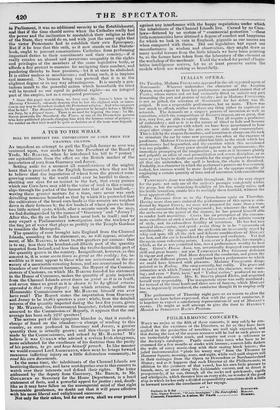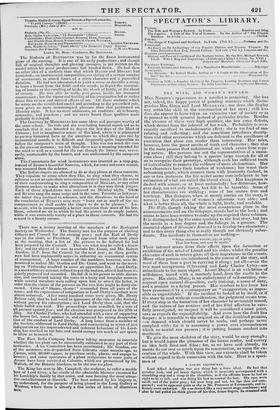PHILHARMONIC CONCERTS.
WHEN we arrive at the fifth of these concerts, it may safely be con- cluded that the exertions of the Directors, as far as they bare been applied to the production of novelties, are well eigh expended, and that during the rest of the season recourse will be had to such pieces as are immediately within reach, and require not even a reference to the Society's catalogue. Pupils crowd into town who have to be crammed for a few months or weeks with lessons; concert-bills darken the walls of every music-shop with their staring black letters; the jaded instrumentalist "plods his weary way" from the Theatres to Hanover Square, morning, noon, and night, while well-paid singers roll in their carriages from the Opera to Devonshire or Northumberland House; and as it happens that each Director of the Philharmonic, In addition to the guidance of that vessel, has his own little pinnace to launch, man, or steer along this fashionable current, and to direct it prosperously, if he can, through all time rocks and quicksands, rapids and whirlpools, which threaten him on every side, no wonder if the good ship in which he has only a divided responsibility sometimes drift a little to leeward towards the conclusion of her voyage.
ACT I.
Sinfonia in II Bat BEETROVZIC Aria, Signor Miami, "0 cara immagine," (Die Zaeberflote) MOZART. Concerto, Pianoforte, in A minor, Mr. Mins Houma.
Tertetto. Madlle G.G al sk Signor Run arr. e Sig r or LA acacias.
" peril l'amore." tOtells) Rows:. Overture, (US.) Joan of Are Idosen
• CT II.
Sinfonia. (No. 8) HAYDN.
Aria, Signor LAUF-ACHE." Vit shramando" (Faint) SPOHE.
Concentrate ; Flute, Oboe. Clarinet, Bassoon, I I orn. Trumpet, and Double Bass, Messrs.NICHOLSON, O. COOKE, WILLMAN.
BAUMANN. HARPER, and DRAOONETTI Chevalier Noe some Aria, Madlle G. GRIM. "Tariti affetti," (La Donna del Lays) BOSAINI. Overture, Der iesehidx C.31.vonWisza. Leader, Mr. Mont—Conductor, Mr. BOSCHEY-ES.
The Sinfonia of BEETHOVEN was by far the finest instrumental pieee of the evening. It is one of his early productions ; and though full of original thoughts and glowing passages, is yet written on the
model which his great predecessors had handed down. He had then no other idea of a sinfonia than that which HAYDN and MOZART had
furnished—an instrumental composition, corsisting of a certain number of movements, in stated times, of a given character and a prescribed duration. He bad not adventured to paint a scene or describe a story, to learn a lesson from the fields and the woods, to depict the murmur- ing of brooks or the carolling of birds, the shock of battle, or the shout of victory. He was able to walk, pan i passe, beside his immortal countrymen ; but the vigour and fertility of his imagination led or rather
drove hint to new and untried efforts of art. Of those sinfonie which he wrote on the established model and according to the prescribed rule, none gives us more uninterrupted pleasure than that performed on Monday night. It has no mere oddnesses, no crudities: all is beauty, symmetry, and grandeur ; and we never heard these qualities more perfectly developed. The Overture by Most:tit:LEA has some ideas arid passages worthy of the same school. Its title and the concluding funeral march led us to conclude that it was intended to depict the last days of the Maid of Orleans ; but in imaginative music of this kind, where it is attempted to portray historical facts or the emotions to which they give rise by instrumental sounds, it is difficult and frequently quite impossible to
follow the composer's train of thought. This was too much the case in the present instance : we felt that there was a meaning intended for the mind as well as a sound for the ear, though the former was, neces- sarily, unattainable by the hearer, and was understood by the composer alone.
The Concertante for wind instruments was inserted as a stop-gap, instead of SPOHR'S beautiful Nonctto, which, for some unknown reason, was removed from the scheme.
The Italian singers are allowed to do as they please at these concerts. They stipulate to come when they like, to sing what they choose, to
rehearse or not as suits their convenience or their fancy, and in the event of their condescending to sing a composition of MOZART, or any other German author, to make what alterations in it they may think proper. Each of these stipulations was enforced on Monday night. GRIN and RUBINI sang the same songs and in the same Terzetto as last year:
the latter they declined to rehearse, and the directions to the hand at the conclusion of Ilumm's song were "leave out as much of the ac-
companiment as shall enable the singer to do as he pleases." La- OLACIIE, who is incomparably a better musician than most of his bre- thren, selected an air to which he had the power to do ample justice, while it was eminently worthy of a place in these concerts. He had his reward in a hearty encore.























 Previous page
Previous page